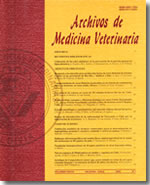Effect of diet inclusion of ethanolic extract of propolis on broiler immunity
Main Article Content
Abstract
The aim of this study was to evaluate the supplementation of ethanolic extract of propolis (EEP) in broiler chickens diets on immune responses (humoral and cellular), weight of lymphoid organs and hematological profile. A total of 192 birds, raised in metabolism cages until the 21st day, were distributed in a completely randomised design with six treatments, eight replicates and four birds per experimental unit. The treatments consisted of diets containing 0; 1,000; 2,000; 3,000; 4,000 and 5,000 ppm of EEP. The inclusion of EEP gave a quadratic effect (P < 0.05) for relative weight of spleen and cloacal bursa, with the lowest weights found at the level of 2,946 ppm and 2,985 ppm of EEP, respectively. For the relative weight of thymus no change was observed (P > 0.05). There was no change (P > 0.05) in percentages of lymphocyte, heterophil, basophil, eosinophil and heterophil: lymphocyte ratio with the inclusion of EEP. However, there was a reduction (P < 0.05) in the percentage of monocyte to the inclusion level of 3,000 ppm of EEP when compared to control. The phagocytic activity of macrophages, the average number of phagocytised red cells and nitric oxide production were not affected (P > 0.05). The interdigital response to phytohaemagglutinin showed negative linear and quadratic behavior (P < 0.05) as a function of time and levels of inclusion, respectively, noting the smallest value of the reaction with 3,074 ppm of EEP. The birds showed a linear increase (P < 0.05) of serum antibodies against Newcastle disease, however, when each level of inclusion was compared to the control no difference was observed (P > 0.05). It is concluded that the addition of 1,000 to 5,000 ppm of EEP to the starter broiler diet did not have immunostimulant effect.

